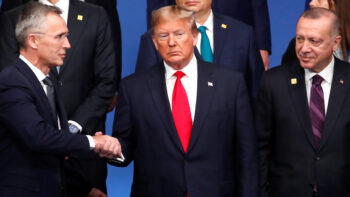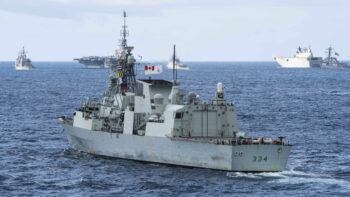
NATO secretary general Jens Stoltenberg will stay on in his role until October 2024, despite indicating his intention to stand down in June (NATO)
BELFAST — NATO allies are set to extended the mandate for secretary general Jens Stoltenberg to lead the alliance for an additional year, which will see him in post until October 2024, following weeks of speculation over a potential successor.
Announced July 4, NATO said in a statement that the mandate decision will be “endorsed” at the forthcoming Heads of State Summit in Vilnius Lithuania, due to take place next week. Stoltenberg added on social media that he was “honored” by the decision, noting that the alliance “is more important than ever.”
It is the third time the former Norwegian prime minister has had his mandate extended since taking on the secretary general position in 2014.
Honoured by #NATO Allies' decision to extend my term as Secretary General until 1 October 2024. The transatlantic bond between Europe & North America has ensured our freedom & security for nearly 75 years, and in a more dangerous world, our Alliance is more important than ever.
— Jens Stoltenberg (@jensstoltenberg) July 4, 2023
Only weeks ago he had declared to media that he would step down from his post this October. He has not publicly commented on why he decided to stay on. NATO secretary general’s are appointed by consensus of the alliance’s 31 member states.
UK defense secretary Ben Wallace had been seen as a leading candidate to succeed Stoltenberg, but he revealed in a June interview with the Economist that he was out of the race for the role. Other reports have suggested that political disagreements and dislike of a non-EU leader had contributed to some within the alliance unwilling to endorse a British candidate.
Similarly, Danish prime minister Mette Frederiksen, previously touted as a successor to Stoltenberg, also said last month that she was “not a candidate,” according to Reuters.
Stoltenberg has guided NATO through a particularly turbulent period after Russia’s decision to invade Ukraine in February 2022 with allies largely united on military aid packages, increased defense spending and expanding the alliance by welcoming Finland and, likely, Sweden.
During the Head’s of State Summit he is expected to lead discussions on a new agreement that would see all alliance members commit to a defense spending target above the current 2 percent GDP level, per member, and potentially formally approve Sweden’s membership.



















![vlcsnap-2023-01-25-09h34m31s959[1]](https://breakingdefense.com/wp-content/uploads/sites/3/2024/11/vlcsnap-2023-01-25-09h34m31s9591-350x175.png)


